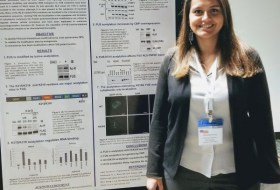News
Unicauca graduate advances research that would allow for the first time to implement a therapy in the treatment of ALS
Alexandra Arenas, a graduate of the Biology program, has been conducting research for four years on Amyotrophic Lateral Sclerosis (ALS), considered the third neurodegenerative disease in incidence, after Alzheimer's and Parkinson's. The journal Human Molecular Genetics of the Oxford University Press will publish the scientist's doctoral thesis.
Alexandra Arenas’ doctoral thesis, graduated in 2013 from the Biology program of the Faculty of Natural, Exact and Educational Sciences, is innovative in the field of ALS, a disease that affects the motor neurons that are responsible for sending the signals from the voluntary movement from the brain to all muscles in the body.
"Having graduated from a public higher education institution in Colombia such as the Universidad del Cauca represents a great pride because Alma Mater offers us all the tools to succeed in the professional field anywhere in the world," said Alexandra Arenas, who for four years, he conducted research on Amyotrophic Lateral Sclerosis (ALS), considered the third neurodegenerative disease in incidence, after Alzheimer's and Parkinson's.
The scientist works in Dr. Haining Zhu's laboratory, which belongs to the Molecular and Cellular Biochemistry department, in collaboration with the Department of Toxicology and Cancer Biology. The research group to which the young Cauca scientist belongs, uses different biochemical and cell biology techniques to investigate neurodegenerative diseases such as ALS (or ALS).
The thesis project of a graduate of the University of Cauca and a doctor in Toxicology and Cancer Biology from the University of Kentucky (United States) was accepted for publication as an academic article in the scientific journal Human Molecular Genetics of the Oxford University Press.
According to Dr. Arenas, Amyotrophic Lateral Sclerosis (ALS) is characterized by generating muscular atrophy and inhibition of voluntary movement of the muscles, causing death two to five years after the diagnosis of the disease. About 10% of the cases of this pathology can be explained by means of heredity, but about 90% of the cases its cause is unknown.
However, mutations in certain genes that are involved in hereditary and spontaneous cases have been identified, so Dr. Zhu's laboratory is interested in understanding how the mutations of these genes that are involved with the disease modify the function of proteins and their behavior in different roles in cells such as cellular stress, mitochondrial dysfunction and transport of proteins by the axons of neurons.
The concept of axon is used in the field of biology to refer to the very thin continuation of a neuron, through which this cell sends nerve impulses to other types of cells. One of the most important functions of axons is to drive the nerve impulse.
In 2014, this researcher entered the Integrated Biomedical Sciences IBS doctorate program, after a year of studying subjects and doing rotations in four different laboratories, she chose Dr Haining Zhu's laboratory, because she was struck by working on neurodegenerative diseases . After the second year, she finished subjects and passed the exam that gave her the title of doctoral candidate.
With her thesis project, she sought to identify post-translational modifications that can alter the function of the FUS protein, which has been reported to have mutations in ALS. She found that a post-translational modification called acetylation prevents the FUS protein from interacting with nucleic acids such as RNA.
He explained that, in addition, acetylation at another lysine residue of the FUS protein, prevents it from interacting with another protein called Transportin-1 and that FUS cannot be imported from the cytoplasm into the nucleus, "and therefore ends up accumulating aberrantly in the cytoplasm forming inclusions that are toxic to cells.”
He asserted that fibroblast cells derived from ALS patients have high levels of acetylation compared to controls, which leads us to believe that acetylation in this protein may have an important role in the pathogenicity of the disease and / or serve as a marker of this disease.
Furthermore, this project is innovative in the field of ALS, because up to now no acetylation profiles have been reported in this protein. The results of this study provide new information that helps to identify the elements that regulate this protein and in this way therapies can be developed for this disease that so far has no cure or medical treatment.
“I am very grateful to all the professors at the Universidad del Cauca who gave me the foundations to start and finish my graduate career in the United States satisfactorily, for which I call on all the directors and the local and national governments to continue supporting the field of research in public universities,” said the brilliant professional, who during her entire time of study was supported with two scholarships: An NIH fellowship. Training Grant T32. Molecular Mechanisms of Toxicity Training- 2017-2020, Lyman T. Johnson Academic Year Fellowship 2014-2017.
"In these moments of pandemic, it is crucial that the voices of scientists are heard and resources are invested in the development of biotechnology that mitigates the negative effects that diseases cause in the population," Alexandra Arenas finally pointed out.
More Info:
Biology Program
Email: biofcned@unicauca.edu.co


